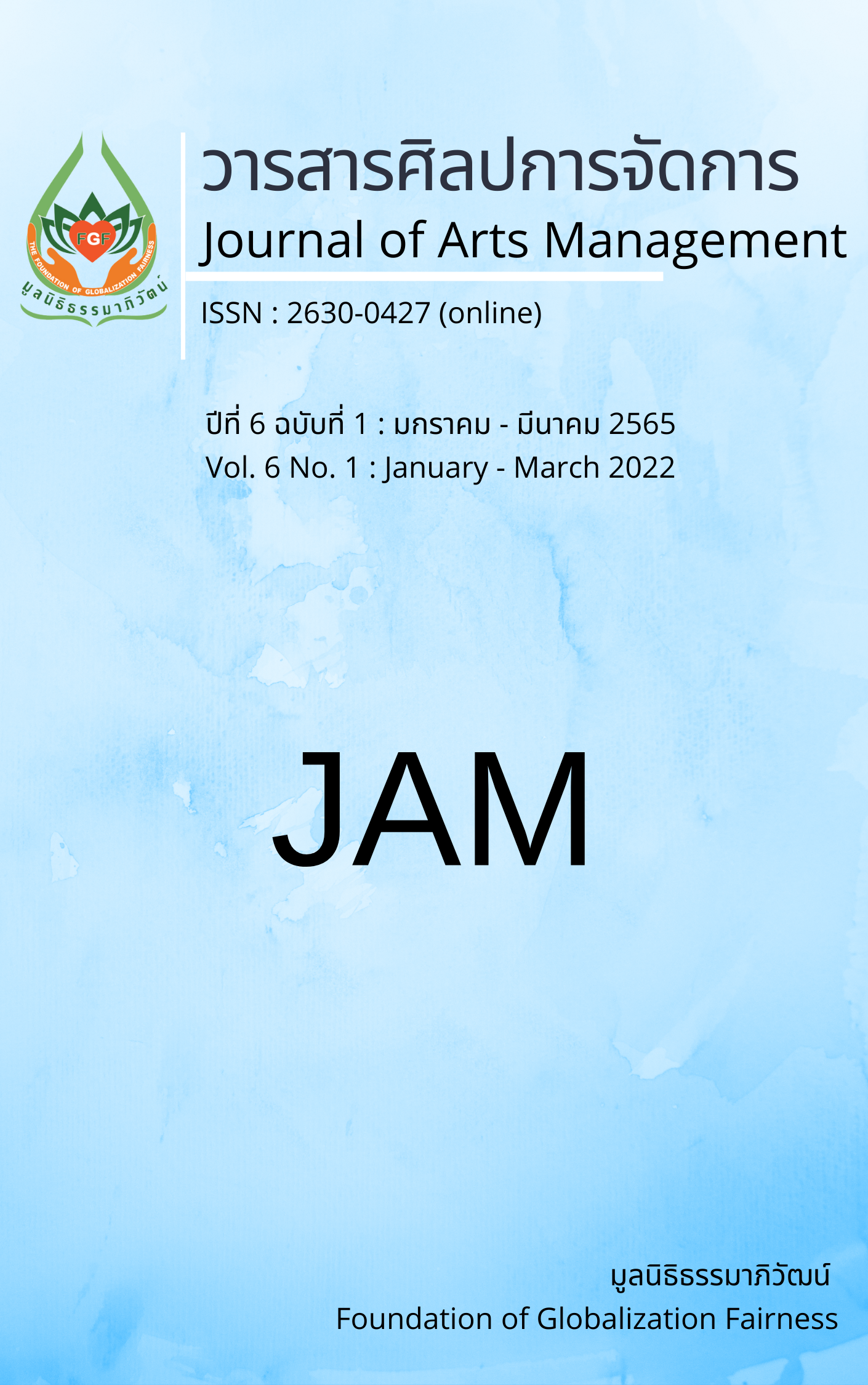Factors Affecting the Adoption of Solar Cell Renewable Energy Technology in the Time of the Covid-19 Crisis of Consumers in Bangkok
Main Article Content
Abstract
This article aimed to 1) study the adoption level of solar cell renewable energy technology in the time of the Covid-19 crisis of consumers in Bangkok; and (2) study the factors affecting the adoption of solar cell renewable energy technology in the time of the COVID-19 crisis of consumers in Bangkok. This research was quantitative research. The population was the consumer who was interested in installing solar panel equipment in Bangkok. The sample size used in the research consisted of 400 people who are consumers interested in installing solar panel equipment in Bangkok to use electricity in their residences on a regular basis. Using a purposive sampling method. The tool used for collecting data is a questionnaire. The statistics used in the analysis were frequency, percentage, mean, standard deviation, t-test, and one-way ANOVA. Major Findings were as follows: (1) the adoption level of solar cell renewable energy technology in the time of the Covid-19 crisis of consumers in Bangkok, in overall, most of them are at the highest level; and (2) factors affecting the adoption of solar cell renewable energy technology in the time of the Covid-19 crisis of consumers in Bangkok, it was found that difference on gender, age, family status, average monthly income, education level, and occupation, who have different the adoption level of solar cell renewable energy technology, significantly level at 0.05.
Article Details

This work is licensed under a Creative Commons Attribution-NonCommercial-NoDerivatives 4.0 International License.
Views and opinions appearing in articles in the Journal of Arts of Management It is the responsibility of the author of the article. and does not constitute the view and responsibility of the editorial team I agree that the article is copyright of the Arts and Management Journal.
References
Akaramingmongkol, V., Srivardhana, T., & Sajjanit, C. (2020). Technology acceptance of battery electric vehicle as mediator from online community to customer citizenship behavior. Pathumthani University Academic Journal, 12(1), 412-423.
Antón, C., Camarero, C., & Rodríguez, J. (2013). Usefulness, enjoyment, and self-image congruence: The adoption of e‐book readers. Psychology & Marketing, 30(4), 372-384. https://doi.org/10.1002/mar.20612
Boyd, S., Parikh, N., Chu, E., Peleato, B., & Eckstein, J. (2010). Distributed optimization and statistical learning via the alternating direction method of multipliers. Machine Learning, 3(1), 1-122. DOI: 10.1561/2200000016
Davis, F. D. (1989). Perceived usefulness, perceived ease of use, and user acceptance of information technology. MIS Quarterly, 13(3), 319-340. https://doi.org/10.2307/249008
Jiravaswong, P. (2013). A study using electricity cost from solar system energy for household appliances[Master’s Thesis, Dhurakij Pundit University].
Kumar, N., Scheer, L., & Kotler, P. (2000). From market driven to market driving. European Management Journal, 18(2), 129-142. https://doi.org/10.1016/S0263-2373(99)00084-5
Ministry of Energy. (2020). Energy management system management. Ministry of Energy.
Pansorn, T., & Chucharukun, K. (2019). Behavioral acceptance of electric vehicles in Bangkok. Journal of Transportation and Logistics, 12(1), 68-90.
Phinitthanapong, P. (2019). The study of factors affecting behaviour to use solar cell for industrial factory in Thailand[[Master’s Thesis, Mahidol University].
Puripunpinyoo, A. (2019). Factors effecting the commercial solar cell electrical energy investment of agricultural co-operatives ltd. members in the Northeast of Thailand. Electronic Journal of Open and Distance Innovative Learning, 10(1), 120-142.
Roh, W., Seol, J. Y., Park, J., Lee, B., Lee, J., Kim, Y., Cho, J., Cheun, K., & Aryanfar, F. (2014). Millimeter-wave beamforming as an enabling technology for 5G cellular communications: Theoretical feasibility and prototype results. IEEE Communications Magazine, 52(2), 106-113. DOI:10.1109/MCOM.2014.6736750
Sitthikosol, S., Sasithanakornkaew, S., & Apisupachoke, W. (2021). Factors affecting intention to use solar cell technology among people in Bangkok through the theory of planned behavior: TPB. Journal of MCU Nakhondhat, 8(4), 203-217.
Thisopha, C., & Iamratanakul, S. (2019). Factors influencing the decision to install a solar power system for residential homes by using analytic hierarchy process. Journal of Interdisciplinary Research Graduate Studies, 8(2), 400-409.


